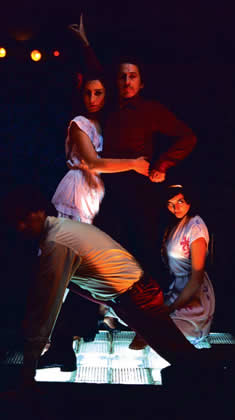 TONY MANERO is set on the streets of Santiago, Chile in 1978 to the throbbing backbeat of the Saturday Night Fever soundtrack punctuated by the random thrashings of Pinochet’s military, TONY MANERO reveals a palpably gritty alternate reality to the days of disco in 1970s America. In a sharp juxtaposition of discomania and dictatorship, Larraín swirls his story around Raúl Peralta (Alfredo Castro), a middle-aged man obsessed with perfecting his impersonation of “Tony Manero,” the protagonist of Saturday Night Fever – and of Raúl’s highly combustible inner fantasy world. Often the only one in the movie theater, Raúl recites dialogue in an effort to embody his hero, and to win an upcoming look-alike contest on national television. He practices his moves with a loosely knit de facto family of overgrown dance buffs who find solidarity and escape in disco at a time when stepping out of line in real life results in torture, imprisonment or death. Fueled by obsession, Raúl navigates toward the transcendental performance he covets in his mind taking whatever he needs along the way in a series of random sexual gropings and acts of violence that bring him instant but fleeting gratification. Raúl and his compatriots revert to primal behavior as their society crumbles around them, alternately clinging to and turning on one another as dictated by their physical, emotional, financial and political needs of the moment.
TONY MANERO is set on the streets of Santiago, Chile in 1978 to the throbbing backbeat of the Saturday Night Fever soundtrack punctuated by the random thrashings of Pinochet’s military, TONY MANERO reveals a palpably gritty alternate reality to the days of disco in 1970s America. In a sharp juxtaposition of discomania and dictatorship, Larraín swirls his story around Raúl Peralta (Alfredo Castro), a middle-aged man obsessed with perfecting his impersonation of “Tony Manero,” the protagonist of Saturday Night Fever – and of Raúl’s highly combustible inner fantasy world. Often the only one in the movie theater, Raúl recites dialogue in an effort to embody his hero, and to win an upcoming look-alike contest on national television. He practices his moves with a loosely knit de facto family of overgrown dance buffs who find solidarity and escape in disco at a time when stepping out of line in real life results in torture, imprisonment or death. Fueled by obsession, Raúl navigates toward the transcendental performance he covets in his mind taking whatever he needs along the way in a series of random sexual gropings and acts of violence that bring him instant but fleeting gratification. Raúl and his compatriots revert to primal behavior as their society crumbles around them, alternately clinging to and turning on one another as dictated by their physical, emotional, financial and political needs of the moment.
Pablo Larrain, director of Tomy Manero was born in Santiago de Chile in 1976, Larraín studied film direction and audiovisual communication at UNIACC University. In 2005 he produced and directed his first feature film called Fuga, which was commercially released in March 2006. During 2006 he produced a film called La Vida Me Mata (Life Kills Me), directed by Sebastián Silva. In 2007 Pablo Larraín worked on Tony Manero, which won the top prize at the 26th annual Turin Film Festival, as well as the FIPRESCI prize for best film, and the best actor honor for Alfredo Castro. Tony Manero is Chile’s submission to the 81st Academy Awards for the Academy Award for Best Foreign Language Film.
Bijan Tehrani: How did you first encounter the story of Tony Manero? What was your motivation in making this film?
Pablo Larrain: We tried to connect this story to what was going on in the government during those days. We wanted to connect this story to the smashing influence that was coming in from the United States to Chile, and the cost of it. We began with one single character who would be a serial killer and a disco dancer. How I got to this combination? I don’t know. But after this we started to develop the script. In the end I tried to do three things. One was to find a  mood, a tone, and an atmosphere; Second, to place this small story in the middle of an enormous context in order to see how this story pushes against the context; Thirdly, we tried to get close with one character, and see what happens if you are following just one person obsessively and how can you tell the context through this one character. We wanted to know if it would be enough to tell who this guy is by just looking at him. We don’t have establishing shots, we didn’t need it. If you just look at the character you can understand everything. Modern audiences are very intelligent in a way, and you don’t need many elements to tell a story. That is one thing that came up when we created this story.
mood, a tone, and an atmosphere; Second, to place this small story in the middle of an enormous context in order to see how this story pushes against the context; Thirdly, we tried to get close with one character, and see what happens if you are following just one person obsessively and how can you tell the context through this one character. We wanted to know if it would be enough to tell who this guy is by just looking at him. We don’t have establishing shots, we didn’t need it. If you just look at the character you can understand everything. Modern audiences are very intelligent in a way, and you don’t need many elements to tell a story. That is one thing that came up when we created this story.
BT: While I was watching this film, I was thinking that Raul is indirectly a symbol of the kind of people who were running the country back then.
PL: Yes, he is a metaphor for the rest of the people, you are right on that. His behavior is also the behavior of a regime.
BT: Yes, they try to do anything to stay in power. I think that this was very clearly passing through him.
PL: I would also add that his ambition is to become someone else, an American cinematic icon. This represents, in a way, what was happening in Chile. The film is set in 1978, and in 1976 a whole bunch of young economists coming from Chicago University, called the Chicago Boys, were hired by the government to set up all the capitalist systems. We started to import social models, economic models, and cultural models from the U.S. His desire to import a different reality that he thinks is possible for him is also what the government intended to do. His failure is also the failure of what the government tried to do. You cannot, from one day to another, pretend that you are different from what you really are. You cannot block your past, your culture, and your thinking. If you do, maybe you can put it into a box for a while, but it will explode eventually, and flowers will come out of it again.
BT: That is very true. How did you find the actor who plays the main character? He really fits the character well.
PL: I have been working with Alfredo Castro for many years. I also was one of his students in a drama school, he was my teacher. I think he is an extraordinary actor that has something that I really enjoy, which is that you don’t  really know what he is thinking. He is so light and dark, and he combines so many elements. He tells a lot without saying anything. His is Chilean, and is very well known in Chile. This is an unforgettable role.
really know what he is thinking. He is so light and dark, and he combines so many elements. He tells a lot without saying anything. His is Chilean, and is very well known in Chile. This is an unforgettable role.
BT: Were most of the actors professional?
PL: They are all professional. They are actors that work in method acting. We all got into the right tone, and we didn’t move from it.
BT: How did you create the visual style of the film?
PL: I wanted to get close to the films that were done in Chile in the late 1960’s, before the coup. This was social cinema based on the documentary shooting style. Those films really inspired me, because those films had a very strong political point of view without being a pamphlet. They found something that is very unique for our society. It’s a camera that is always on and moving, and it sometimes goes against him, or goes away from him, or gets very close to him. That imperfection becomes some of the style of it.
BT: How have the people of Chile responded to this film?
PL: It has been very good, in general. The box office was double of what we expected. We thought that it would not fit the taste of the masses. It did well for the type of film that it is. The critics, in general, have been extremely positive. We have been on a very long and exhausting round of film festivals. We have been to Cannes, Hamburg, Toronto, Turin, and many others. The Chilean critics were pretty divided. This is a film in Chile that you either love or hate. Some of the critics thought that the context was over exposed, but that is exactly what is being well received internationally. I am glad though. We have had a lot of debate in Chile; some like it, some don’t. But people are talking about it. We sparked a debate and provoked something, which is great. I am excited to find out what is going to happen when it releases in France, the UK, Italy, Brazil, New Mexico, Venezuela, and more. It is one thing to see how the audiences in film festivals like it, but I am excited to know what the feelings are around the world. That is going to be very interesting.
BT: What is your next project?
PL: I can tell you very little, but I am working on something. It is not very helpful to talk about projects for me, but more helpful to talk about films. We will probably be shooting in October. It is a film about an assistant from the legal medical service in Santiago, on the day of the coup in 1973. His work is to write down the autopsies. The following days his work becomes really busy because so many people die. The story begins when his lover disappears, and he seeks her out in a city that is under the military occupancy.

